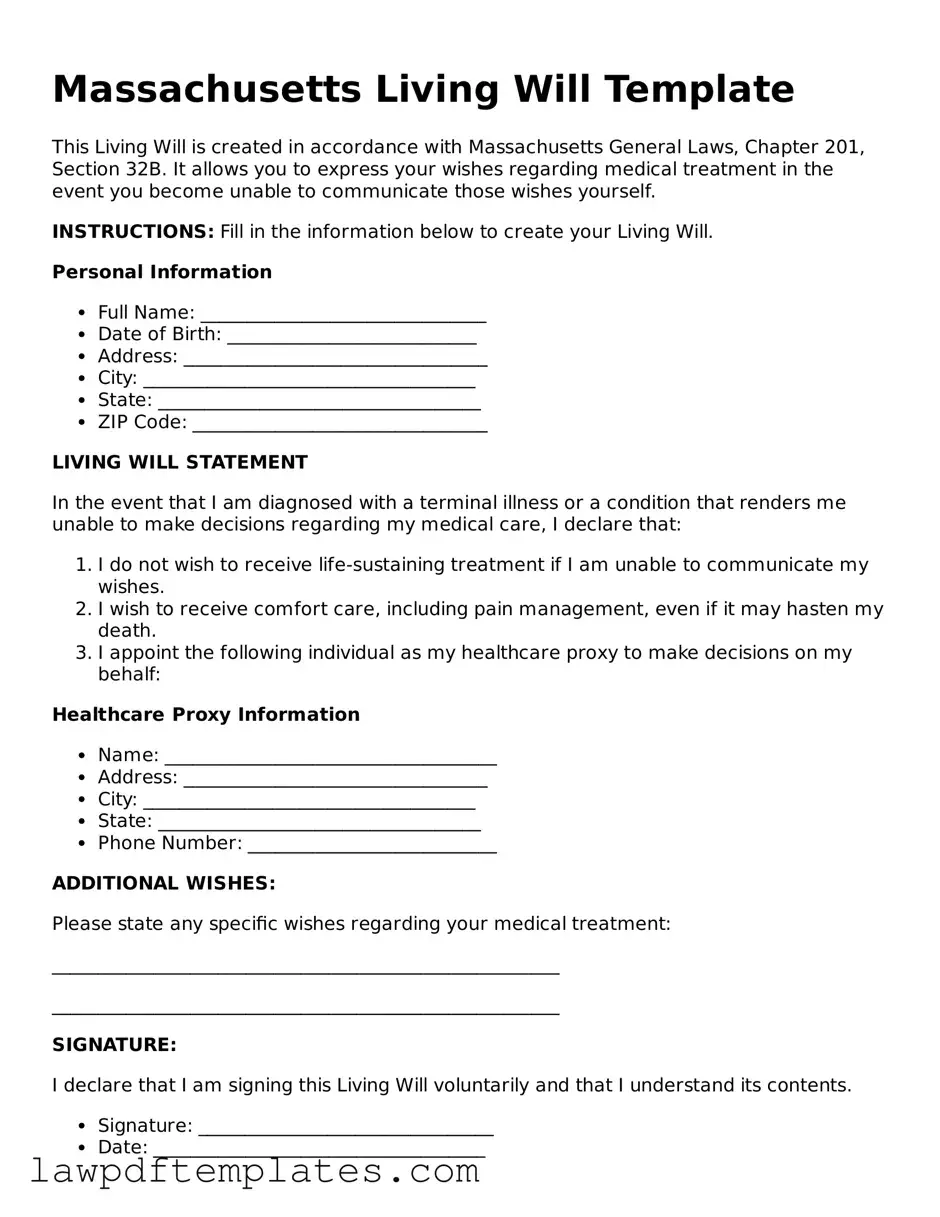Free Living Will Template for the State of Massachusetts
Form Breakdown
| Fact Name | Details |
|---|---|
| Definition | A Massachusetts Living Will is a legal document that outlines an individual's wishes regarding medical treatment in case they become unable to communicate their preferences. |
| Governing Law | The Massachusetts Living Will is governed by Massachusetts General Laws, Chapter 201, Section 8B. |
| Requirements | The document must be signed by the individual and witnessed by two adults who are not related to the individual or beneficiaries of their estate. |
| Revocation | Individuals can revoke their Living Will at any time, provided they communicate their decision to healthcare providers. |
| Effectiveness | The Living Will takes effect only when the individual is unable to make their own medical decisions, as determined by a physician. |
Sample - Massachusetts Living Will Form
Massachusetts Living Will Template
This Living Will is created in accordance with Massachusetts General Laws, Chapter 201, Section 32B. It allows you to express your wishes regarding medical treatment in the event you become unable to communicate those wishes yourself.
INSTRUCTIONS: Fill in the information below to create your Living Will.
Personal Information
- Full Name: _______________________________
- Date of Birth: ___________________________
- Address: _________________________________
- City: ____________________________________
- State: ___________________________________
- ZIP Code: ________________________________
LIVING WILL STATEMENT
In the event that I am diagnosed with a terminal illness or a condition that renders me unable to make decisions regarding my medical care, I declare that:
- I do not wish to receive life-sustaining treatment if I am unable to communicate my wishes.
- I wish to receive comfort care, including pain management, even if it may hasten my death.
- I appoint the following individual as my healthcare proxy to make decisions on my behalf:
Healthcare Proxy Information
- Name: ____________________________________
- Address: _________________________________
- City: ____________________________________
- State: ___________________________________
- Phone Number: ___________________________
ADDITIONAL WISHES:
Please state any specific wishes regarding your medical treatment:
_______________________________________________________
_______________________________________________________
SIGNATURE:
I declare that I am signing this Living Will voluntarily and that I understand its contents.
- Signature: ________________________________
- Date: ____________________________________
This document should be witnessed by two individuals who are not related to you and who will not benefit from your estate.
WITNESSES:
- Witness 1 Name: ____________________________
- Witness 1 Signature: ______________________
- Date: ____________________________________
- Witness 2 Name: ____________________________
- Witness 2 Signature: ______________________
- Date: ____________________________________
Common mistakes
Filling out a Massachusetts Living Will form can be a straightforward process, but mistakes can happen. One common error is not specifying treatment preferences clearly. Individuals may use vague language that can lead to confusion about their wishes. Clear and specific instructions help ensure that healthcare providers understand what the individual desires.
Another mistake is failing to date the document. A Living Will should be dated to establish when the preferences were made. Without a date, it may be difficult to determine if the document reflects the most current wishes of the individual.
Omitting a signature is another frequent oversight. A Living Will must be signed by the individual to be considered valid. Some people may forget this crucial step, which can render the document ineffective.
People often neglect to inform family members or healthcare proxies about the existence of the Living Will. This can lead to confusion during critical moments when decisions need to be made. Sharing this information ensures that loved ones are aware of the individual's wishes.
Another common error is not reviewing the document regularly. As circumstances and preferences may change over time, it is important to revisit the Living Will periodically. Failing to do so can result in outdated instructions that do not reflect current values or desires.
Some individuals may also forget to include alternate healthcare proxies. If the primary proxy is unavailable or unable to act, having alternatives is essential. Without this, decisions may be delayed or made by someone who does not understand the individual's wishes.
Another mistake is not following the state-specific requirements for witnessing or notarization. Massachusetts has specific rules about how the Living Will should be executed. Ignoring these requirements can lead to complications in the document’s validity.
People sometimes make the mistake of using legal jargon or complex language in their Living Will. This can create ambiguity and lead to misinterpretation. It is best to use straightforward language that clearly conveys intentions.
Lastly, failing to keep the document in a safe but accessible place can pose challenges. If the Living Will cannot be found when needed, it may not serve its intended purpose. It is advisable to store the document securely while ensuring that trusted individuals know where to locate it.
Discover More Living Will Templates for Specific States
Living Will Arizona - It is advisable to discuss your Living Will with family to ensure they understand your wishes.
To simplify the process of transferring ownership, the Trailer Bill of Sale form can be easily accessed through resources like PDF Documents Hub, ensuring you have the right documentation at your fingertips for a smooth transaction.
Living Will Free Forms - A Living Will is essential for anyone who wants to avoid unwanted medical interventions at the end of life.
